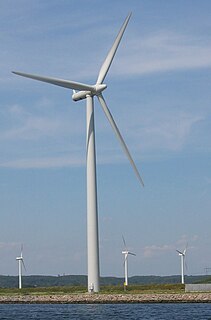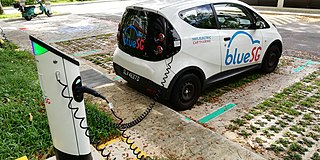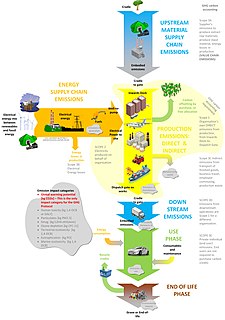Related Research Articles
The United Kingdom's Climate Change Programme was launched in November 2000 by the British government in response to its commitment agreed at the 1992 United Nations Conference on Environment and Development (UNCED). The 2000 programme was updated in March 2006 following a review launched in September 2004.

The Carbon Trust was developed and launched during the first Blair Administration (1997-2001) as part of the development of the Climate Change Levy (CCL), a tax on business energy use that still operates today. The Carbon Trust was originally funded by around £50m of tax revenue generated from the Levy to help businesses reduce energy costs and therefore offset the additional cost of paying the CCL. The establishment of the Carbon Trust was announced in the 2000 White Paper "Climate Change - the UK Programme". It was launched alongside the introduction of the CCL in April 2001.

A carbon footprint is the total greenhouse gas (GHG) emissions caused by an individual, event, organization, service, place or product, expressed as carbon dioxide equivalent (CO2e). Greenhouse gases, including the carbon-containing gases carbon dioxide and methane, can be emitted through the burning of fossil fuels, land clearance and the production and consumption of food, manufactured goods, materials, wood, roads, buildings, transportation and other services.

A carbon offset is a reduction or removal of emissions of carbon dioxide or other greenhouse gases made in order to compensate for emissions made elsewhere. Offsets are measured in tonnes of carbon dioxide-equivalent (CO2e). One ton of carbon offset represents the reduction or removal of one ton of carbon dioxide or its equivalent in other greenhouse gases. One of the hidden dangers of climate change policy is unequal prices of carbon in the economy, which can cause economic collateral damage if production flows to regions or industries that have a lower price of carbon—unless carbon can be purchased from that area, which offsets effectively permit, equalizing the price.
Business action on climate change includes a range of activities relating to climate change, and to influencing political decisions on climate change-related regulation, such as the Kyoto Protocol. Major multinationals have played and to some extent continue to play a significant role in the politics of climate change, especially in the United States, through lobbying of government and funding of climate change deniers. Business also plays a key role in the mitigation of climate change, through decisions to invest in researching and implementing new energy technologies and energy efficiency measures.

Food miles is the distance food is transported from the time of its making until it reaches the consumer. Food miles are one factor used when testing the environmental impact of food, such as the carbon footprint of the food.

Clean technology, in short cleantech, is any process, product, or service that reduces negative environmental impacts through significant energy efficiency improvements, the sustainable use of resources, or environmental protection activities. Clean technology includes a broad range of technology related to recycling, renewable energy, information technology, green transportation, electric motors, green chemistry, lighting, grey water, and more. Environmental finance is a method by which new clean technology projects can obtain financing through the generation of carbon credits. A project that is developed with concern for climate change mitigation is also known as a carbon project.
Various energy conservation measures are taken in the United Kingdom.

Carbon accounting or greenhouse gas accounting refers to processes used to measure how much carbon dioxide equivalents an organization emits. It is used by states, corporations, and individuals to create the carbon credit commodity traded on carbon markets. Examples of products based on forms of carbon accounting may be found in national inventories, corporate environmental reports, and carbon footprint calculators.

Like other emissions resulting from fossil fuel combustion, aircraft engines produce gases, noise, and particulates, raising environmental concerns over their global effects and their effects on local air quality. Jet airliners contribute to climate change by emitting carbon dioxide, the best understood greenhouse gas, and, with less scientific understanding, nitrogen oxides, contrails and particulates. Their radiative forcing is estimated at 1.3–1.4 that of CO2 alone, excluding induced cirrus cloud with a very low level of scientific understanding. In 2018, global commercial operations generated 2.4% of all CO2 emissions.

The CDP is an international non-profit organisation based in the United Kingdom, Japan, India, China, Germany and the United States of America that helps companies and cities disclose their environmental impact. It aims to make environmental reporting and risk management a business norm, driving disclosure, insight, and action towards a sustainable economy. In 2021, over 14,000 organizations disclosed their environmental information through CDP.

A low-carbon economy (LCE) or decarbonised economy is an economy based on energy sources that produce low levels of greenhouse gas (GHG) emissions. GHG emissions due to human activity are the dominant cause of observed climate change since the mid-20th century. Continued emission of greenhouse gases will cause long-lasting changes around the world, increasing the likelihood of severe, pervasive, and irreversible effects for people and ecosystems. Shifting to a low-carbon economy on a global scale could bring substantial benefits both for developed and developing countries. Many countries around the world are designing and implementing low-emission development strategies (LEDS). These strategies seek to achieve social, economic, and environmental development goals while reducing long-term greenhouse gas emissions and increasing resilience to the effects of climate change.
Energy Saving Trust (EST) is a British organization devoted to promoting energy efficiency, energy conservation, and the sustainable use of energy, thereby reducing carbon dioxide emissions and helping to prevent man-made climate change. It was founded in the United Kingdom as a government-sponsored initiative in 1992, following the global Earth Summit.
The CRC Energy Efficiency Scheme was a mandatory carbon emissions reduction scheme in the United Kingdom which applied to large energy-intensive organisations in the public and private sectors. It was estimated that the scheme would reduce carbon emissions by 1.2 million tonnes of carbon per year by 2020. In an effort to avoid dangerous climate change, the British Government first committed to cutting UK carbon emissions by 60% by 2050, and in October 2008 increased this commitment to 80%. The scheme has also been credited with driving up demand for energy-efficient goods and services.
The milestones for carbon capture and storage show the lack of commercial scale development and implementation of CCS over the years since the first carbon tax was imposed.
The Environmental Investment Organisation (EIO) is a UK-based not-for-profit body dedicated to researching, proposing and implementing solutions to climate change. It has developed the Environmental Tracking (ET) concept, rebranded by ET Index Research in 2016 to Engaged Tracking, into two separate components known as the ET Carbon Rankings and the ET Index Series. The ET Carbon Rankings rate companies based on their greenhouse gas emissions intensity and transparency. The ET Low Carbon & Fossil Free Index Series, which are based on the rankings, provide investors with a tool to incentivise companies to lower emissions while reducing their exposure to potential future carbon 'price shocks'.
At the global scale sustainability and environmental management involves managing the oceans, freshwater systems, land and atmosphere, according to sustainability principles.
The reduction of carbon emissions, along with other greenhouse gases (GHGs), has become a vitally important task of international, national and local actors. If we understand governance as the creation of “conditions for ordered rule and collective action” then, given the fact that the reduction of carbon emissions will require concerted collective action, it follows that the governance of carbon will be of paramount concern. We have seen numerous international conferences over the past 20 years tasked with finding a way of facilitating this, and while international agreements have been infamously difficult to reach, action at the national level has been much more effective. In the UK, the Climate Change Act 2008 committed the government to meeting significant carbon reduction targets. In England, these carbon emissions are governed using numerous different instruments, which involve a variety of actors. While it has been argued by authors like Rhodes that there has been a “hollowing out” of the nation state, and that governments have lost their capabilities to govern to a variety of non-state actors and the European Union, the case of carbon governance in England actually runs counter to this. The government body responsible for the task, the Department of Energy and Climate Change (DECC), is the “main external dynamic” behind governing actions in this area, and “rather than hollowing out central co-ordination”. The department may rely on other bodies to deliver its desired outcomes, but it is still ultimately responsible for the imposition of the rules and regulations that “steer (carbon) governmental action at the national level”. It is therefore evident that carbon governance in England is hierarchical in nature, in that “legislative decisions and executive decisions” are the main dynamic behind carbon governance action. This does not deny the existence of a network of bodies around DECC who are part of the process, but they are supplementary actors who are steered by central decisions. This article focuses on carbon governance in England as the other countries of the UK all have devolved assemblies who are responsible for the governance of carbon emissions in their respective countries.
Ecodesk is a cloud based data platform used by corporate businesses to track, monitor and report their ESG data.
Green recovery packages are proposed environmental, regulatory and fiscal reforms to build prosperity in the wake of an economic crisis, like the COVID-19 pandemic or the Global Financial Crisis. They pertain to fiscal measures that intend to recover economic growth while also positively benefitting the environment, including measures for renewable energy, efficient energy use, nature based solutions, sustainable transport, green innovation and green jobs, amongst others.
References
- ↑ Myers, Courtney Boyd (12 April 2011). "Will AMEE save the world from avoiding mass extinction? - TNW Industry". TNW | Insider.
- ↑ "Score Methodology: Learn about AMEE's data and calculation methods. | AMEE".
- ↑ "DirectGov - Act On CO2 Calculator". actonco2.direct.gov.uk.
- ↑ "Home". usv.com.
- ↑ "AMEE Raises $5.5M for Carbon Accounting Engine". 8 February 2010.
- ↑ Butcher, Mike (2 March 2020). "Could lessons from the challenger bank revolution kick-start innovation on the climate crisis?". TechCrunch.